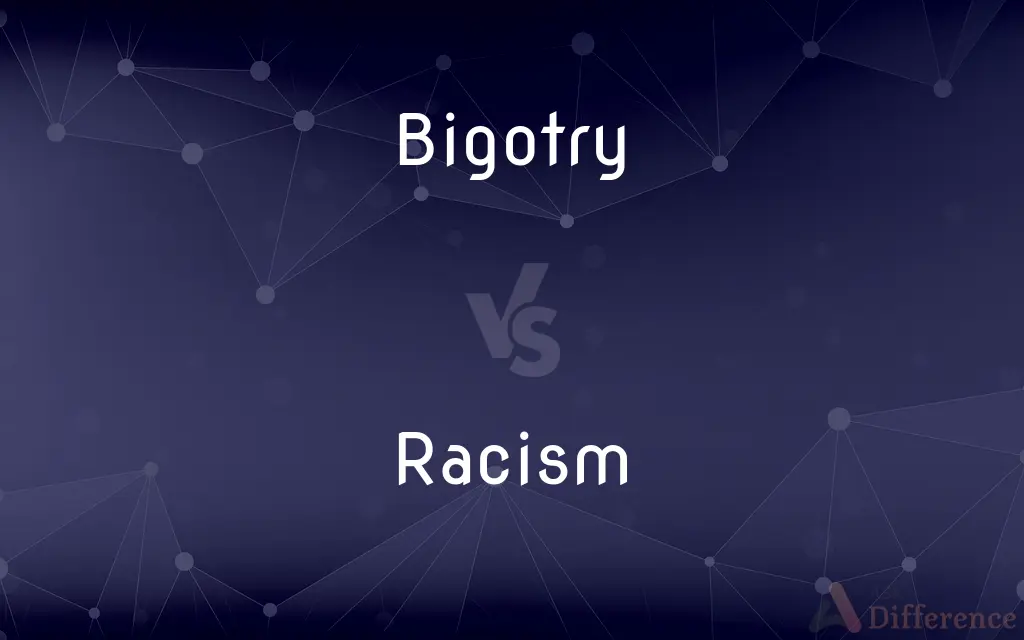Bigotry vs. Racism — What's the Difference?
Edited by Tayyaba Rehman — By Fiza Rafique — Updated on November 6, 2023
Bigotry is intolerance toward those who are different or hold different opinions, while racism is prejudice or discrimination based on race.

Difference Between Bigotry and Racism
Table of Contents
ADVERTISEMENT
Key Differences
Bigotry encompasses an obstinate or intolerant devotion to one's own opinions and prejudices. It can manifest in negative judgments or treatment of individuals based on a variety of aspects, including but not limited to race. Racism specifically refers to the belief that races have distinct characteristics, abilities, or qualities, especially so as to distinguish them as inferior or superior to one another.
While bigotry is a broader term that may involve intolerance toward those with different beliefs, political views, or lifestyles, racism is a specific form of bigotry that categorically discriminates against people based on their racial or ethnic backgrounds. Bigotry is characterized by an unwillingness to accept different opinions or lifestyles, racism is characterized by the belief in racial hierarchies that influence thinking and actions.
A bigot might discriminate against anyone who is different from them, whether that difference is race, religion, or nationality. A racist, however, discriminates specifically on the basis of race, believing their own race to be superior. Bigotry can lead to various forms of discrimination, while racism results specifically in racial prejudice and acts of discrimination.
Bigotry is often a result of ignorance and close-mindedness, leading to general intolerance toward diversity. Racism is deeply rooted in historical power structures and societal norms that privilege certain races over others. While all racism is a form of bigotry, not all bigotry is racism. Racism has specific social and historical contexts that can lead to systemic discrimination.
In the fight against injustice, addressing bigotry means challenging all forms of intolerance, whereas combating racism involves specific actions to address racial prejudice and inequality. Both require continuous efforts to educate and foster understanding but approach prejudice from different angles. While bigotry is a personal attitude, racism is both a personal prejudice and a societal problem.
ADVERTISEMENT
Comparison Chart
Definition
Intolerance toward those who are different.
Prejudice based on race.
Scope
Broad, affecting various social categories.
Specific to race-related issues.
Manifestation
Can be against any differing opinion or lifestyle.
Specifically targets racial characteristics.
Social Impact
Leads to personal discrimination.
Leads to systemic discrimination.
Basis of Prejudice
Diverse: beliefs, lifestyles, etc.
Race: perceived biological differences.
Compare with Definitions
Bigotry
Stubborn and complete intolerance of any creed, belief, or opinion that differs from one's own.
His refusal to even consider other viewpoints was a clear sign of bigotry.
Racism
The belief that different races possess distinct characteristics, abilities, or qualities.
The civil rights movement fought tirelessly to overcome the deep-rooted racism in society.
Bigotry
The state of mind of a bigot: obstinately or intolerantly devoted to his or her own opinions and prejudices.
The company's commitment to diversity was evident in its strong stance against any form of bigotry.
Racism
The belief that one's own race is superior and has the right to dominate others.
His racist remarks were met with immediate condemnation.
Bigotry
Acts or beliefs characteristic of a bigot.
Bigotry in any form has no place in a civilized society.
Racism
A social doctrine or political program based on the assumption of racism.
The regime's policy was criticized internationally for its clear racism.
Bigotry
Unreasonable attachment to a belief, opinion, or faction; a prejudice against personal convictions.
In the heated debate, both sides displayed a level of bigotry that prevented any constructive dialogue.
Racism
Prejudice, discrimination, or antagonism directed against someone of a different race.
The new laws were put in place to curb racism in the workplace.
Bigotry
The attitude, state of mind, or behavior characteristic of a bigot; intolerance.
Racism
Racial prejudice or discrimination.
The organization launched a campaign to educate the public about the effects of racism.
Bigotry
Characteristic qualities of a bigot: (especially religious, anti-religious or racial) intolerant prejudice, opinionatedness, or fanaticism; fanatic intolerance.
Racism
Racism is the belief that groups of humans possess different behavioral traits corresponding to physical appearance and can be divided based on the superiority of one race over another. It may also mean prejudice, discrimination, or antagonism directed against other people because they are of a different race or ethnicity.
Bigotry
(dated) Obstinate prejudice or opinionatedness.
Racism
The belief that race accounts for differences in human character or ability and that a particular race is superior to others.
Bigotry
The state of mind of a bigot; obstinate and unreasoning attachment of one's own belief and opinions, with narrow-minded intolerance of beliefs opposed to them.
Racism
Discrimination or prejudice based on race.
Bigotry
The practice or tenets of a bigot.
Racism
The belief that there are distinct human races with inherent differences which determine their abilities, and generally that some are superior and others inferior.
Bigotry
The intolerance and prejudice of a bigot
Racism
The policies, practices, or systems (e.g. government or political) promoting this belief or promoting the dominance of one or more races over others.
Martin Luther King spoke out against racism.
Bigotry
Intolerance toward those who hold different opinions from oneself.
Her comments were not well received and were labeled as bigotry by her colleagues.
Racism
Prejudice or discrimination based upon race or ethnicity; (countable) an action of such discrimination.
Racism
The prejudice that members of one race are intrinsically superior to members of other races
Racism
Discriminatory or abusive behavior towards members of another race
Common Curiosities
How does one address bigotry in themselves?
Through self-reflection, education, and a willingness to listen and change.
Can racism occur within the same racial group?
Yes, internalized racism can lead to individuals discriminating against their own racial group.
Can bigotry be harmless?
No, bigotry involves intolerance that can lead to harm through discrimination and exclusion.
Does bigotry apply to political views?
Yes, it can apply to any area where there is intolerance for different views or beliefs.
What's the impact of bigotry on society?
It creates division, inhibits progress, and fosters an environment of hostility and exclusion.
Is racism always deliberate?
Racism can be both deliberate and unconscious, embedded in social systems and individual attitudes.
Can institutional practices be racist?
Yes, institutional racism refers to policies and practices that perpetuate racial inequality.
Can combating racism change societal structures?
Yes, addressing racism can lead to systemic change and greater equality.
Are jokes a form of bigotry?
Jokes that perpetuate stereotypes or express intolerance can be a form of bigotry.
Is racism only a personal issue?
No, racism is also a societal issue that affects communities and institutions.
How is racism different from xenophobia?
Racism is based on race, while xenophobia is a fear or hatred of foreigners or strangers.
Are all forms of bigotry based on ignorance?
Often, but not always, as some individuals may be fully aware of their bigotry but maintain their beliefs.
Can education reduce bigotry?
Education can be a powerful tool to increase understanding and reduce intolerance.
Is affirmative action a response to racism?
Affirmative action is a policy designed to address historical and institutional racism by providing opportunities to historically excluded groups.
Does bigotry always lead to discrimination?
While it may not always result in discrimination, bigotry carries the risk of leading to such behaviors.
Share Your Discovery

Previous Comparison
Bitter vs. Sour
Next Comparison
Key vs. IslandAuthor Spotlight
Written by
Fiza RafiqueFiza Rafique is a skilled content writer at AskDifference.com, where she meticulously refines and enhances written pieces. Drawing from her vast editorial expertise, Fiza ensures clarity, accuracy, and precision in every article. Passionate about language, she continually seeks to elevate the quality of content for readers worldwide.
Edited by
Tayyaba RehmanTayyaba Rehman is a distinguished writer, currently serving as a primary contributor to askdifference.com. As a researcher in semantics and etymology, Tayyaba's passion for the complexity of languages and their distinctions has found a perfect home on the platform. Tayyaba delves into the intricacies of language, distinguishing between commonly confused words and phrases, thereby providing clarity for readers worldwide.















































